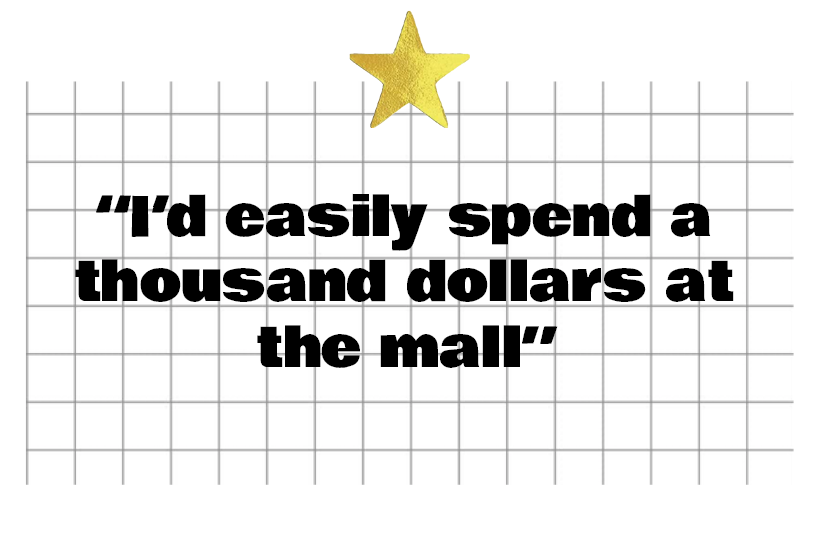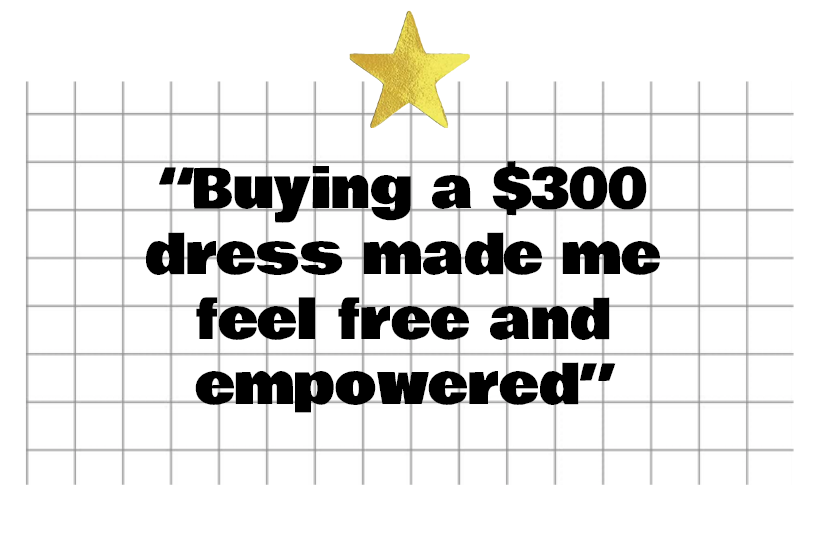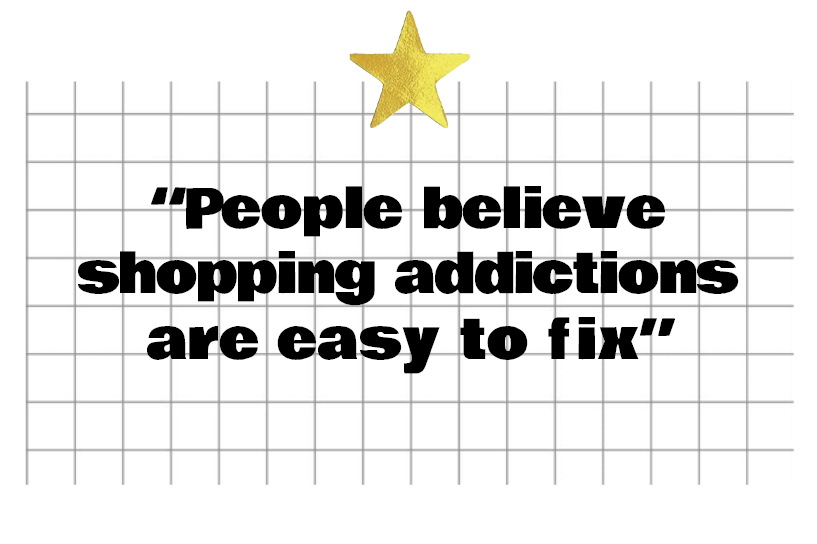Shopping addictions are often portrayed by media as harmless and fun, but can seriously impact your finances and personal relationships – not to mention the planet. We spoke to recovering addicts and a treatment expert to find out why it’s time to take shopping addiction more seriously.
“I use clothes to hide. In the Lebanese Arab community I grew up in, fair skin was the beauty standard. I have a darker complexion and fashion was a way to distract from that. Whenever I felt bad, I’d go to the mall to purchase something that made me feel beautiful. It was my comfort zone and I’d easily spend a thousand dollars. I had to declare bankruptcy because of my shopping.” Nadia*, 31, is a therapist from Michigan. She’s also one of an estimated 2-12% of the American population with a shopping addiction.
Studies showed that 8% of European young people have a shopping addiction, meaning they experience and try to fulfil strong cravings to buy. Some compulsive shoppers focus exclusively on a class of items; clothing, shoes, jewellery, technology… but others shop for a broad range of items — especially when on offer. While men suffer from shopping addictions too, they’re slightly more common among women.

Shopping addictions are similar to other addictive behaviours, but while a substance addiction is often seen as a great personal and social ill, shopping addictions are considered more ‘mild’. This is due to their lack of (possibly life-threatening) physical consequences, and because fast fashion is designed to be highly disposable; encouraging people to come back and buy more stuff they don’t need. If shopping takes on the form of an addiction, it can have serious financial and personal consequences.
Franki, 33, an archaeologist from London, describes her relationship with fashion as “toxic”. “It affects my self-esteem, my wallet and even my relationships. My previous boyfriend wasn’t into fashion at all. It came to a point where I’d make him feel bad about himself, because I pushed him to purchase certain clothes. I wanted him to mirror this image of what I wanted my boyfriend to look like and that’s not healthy.”
Both Nadia and Franki have come to realise their shopping is unsustainable in many ways, but for a long time didn’t see it as an issue at all. “Everyone shops,” Franki says casually. And while Nadia says she’s always enjoyed clothes, it was never a problem for her. Until it was.
Drawing you in
A new top is now only a click away. Fifteen years ago you’d shop in a physical store, but with online shopping and buy-now-pay-later methods, shopping has never been easier. Ads pop up everywhere in our online environment, influencers show us how much fun it is to unbox a shopping haul, and if we try to keep up with ever-changing trends, our wardrobe should be updated every month. All of this feeds into compulsive shopping habits.
“I watch a lot of TV dramas,” Franki says. “I’d see something on there I liked and because of [webshops] like Boohoo, Nasty Gal and Shein, it’s very easy to find really nice replicas of what you see on TV for only £15.” Franki is very into fashion and tries to keep up with trends: “I want to project a certain image, only the problem is the image keeps changing because fashion keeps changing.”
Even when you aren’t looking to shop, sales can still draw you in. Nadia recently unsubscribed from most promotional emails she received but thinks that even if she manages to delete all of them, it wouldn’t be enough. “I’d just see an ad on Instagram instead, saying: ‘20% off this item changed my life.’ And I’d want it to change my life too.” Physical stores are not much better, Nadia says. “I know I shouldn’t have bought [this $200 jacket], and I didn’t even like it that much, but the salesperson was being so nice and I’d been lonely all day… So when she pushed me to buy it, I just didn’t know how to say no.”
Why am I shopping?
Shopping addictions can have all sorts of causes; some find their roots in self-esteem issues, while others go all the way back to childhood traumas, Ishani Noble, self-esteem enhancement coach and founder of Stop Shopping Now – an online support group and training programme for shopping addicts – explains. “Shopping all comes down to the story we tell ourselves about the item we’re buying, and that’s essentially what the marketing people tell us. I’m buying a dress because I’m told I’ll be more attractive, slimmer or more desirable when I wear it.”

Nadia traces her shopping addiction back to the abusive relationship she has with her family. “They’d make me feel like I wasn’t good enough, because I didn’t choose the path they wanted for me.” Since her twenties, whenever Nadia felt inadequate, she’d shop. For Franki, it was all about image: “I care what people think of me and I’m influenced by the things they say. If someone tells me a top looks nice on me and I didn’t even really like it before, I’d still buy it in multiple colours after that. If you have low self-esteem you want validation, which can come from wearing nice clothes and getting compliments.”
The satisfaction and the crash
Short term, satisfying the addiction releases dopamine and produces a high. But once that rush has passed, you can be left with feelings of shame and guilt. “I feel very special when I shop, like a queen even. But right after I remember how much money I spend and how I’ll struggle because of it. It crashes really quickly,” Nadia says. “It’s strange, but buying a $300 dress and being complimented would give me a sense of freedom and empowerment, even though I know it’s bad.”
Franki enjoys the rush of opening parcels: “It’s like a little gift.” But after the initial high, it leaves her feeling guilty. “I’m in an endless cycle where I buy things I think will look nice on me because they look nice on models and TV stars and then after a few weeks I think: ‘why did I even buy this?’”
“It’s almost like there are two different people,” is how Ishani describes it. You have the shopper and the person who deals with the shopper. The shopper only sees the short-term benefits, but the other person sees the bill and regret that will follow. “I train my clients to bring those two together and include the consequences into the decision-making process.”
Time to take it seriously
A search for shopping addict support groups on Facebook takes you to groups where people share offers and promotions; encouraging you to shop. “You can find a budgeting advisor, therapist and Alcoholics Anonymous in every city in the world. But when I was doing some research, there was only one online support group for shopping addicts. In this group people were just complaining about their issues, no one offered long-lasting solutions,” Ishani says.
This might be because there’s a perception that shopping addictions are “easy to fix”. According to Ishani, shopping addicts often try to tackle their habits by focusing on external circumstances, like participating in no-buy challenges or drafting up a budget. “But you need to look inside and realise why you’re shopping before you can start to tackle it. Those external measures won’t stick.”

However, it’s not up to shopping addicts to take on the overarching issues of consumerism and throwaway culture dominating fashion. Brands should produce more sustainably, create long-lasting products and encourage people to rewear their outfits on different occasions, Ishani argues. On top of that, influential people should use their powers for good: “Kate Middleton wore the same outfit to three official events. If there’s anyone who has the means and reasons to opt for different items each time, it’s her. But she didn’t. If influential people start doing that, those who see them as role models will follow.”
In the end, not everyone will develop a shopping addiction in our online-driven shopping world, as some people are simply more sensitive to developing compulsive habits than others. But with about 1 out of 10 European young people being considered shopping addicts and the increasing amount of shopping done via aggressive targeting ads on social platforms, a more careful monitoring and regulation would be wise.
Seven signs of shopping addiction
- You can’t seem to stop. Or you’ve stopped for a short period of time and started up again.
- You get a high from shopping, but the satisfaction is short-lived.
- You go shopping when you’re bored, or use it as a comfort when you’re upset.
- You hide your parcels from family, partners or friends or have them delivered to work or a different address so people won’t notice.
- You’re unable to resist a bargain, even though you know you don’t need it.
- You spend what you have and have little to show of your hard work, other than stuff around the house.
- You tend to get angry or upset when family or friends confront you about your shopping.
*This person asked for their name to be changed.


One reply on “The shopaholic’s struggle: confessions of a shopping addict”
[…] Next, read about the hidden but all-too-common psychological problem of compulsive shopping. […]